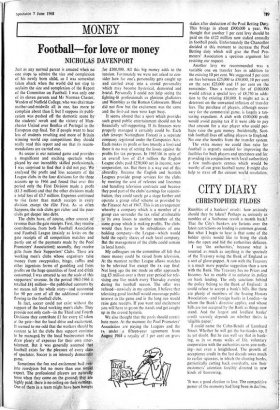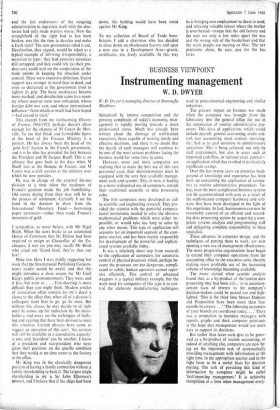CITY DIARY
CHRISTOPHER FILDES
Rumbles of a bankers' revolt: how seriously should they be taken? Perhaps as seriously as rumbles of a Sorbonne revolt a month back? That the City's bankers are furious over the latest restrictions on lending is common ground. But what I begin to hear is that some of the bolder spirits would like to bring the clash into the open and bid the authorities defiance.
I say 'the authorities,' because what is resented as much as anything is the spectacle of the Treasury using the Bank of England as a sort of glove-puppet. A row with the Treasury is a much more popular suggestion than a row with the Bank. The Treasury has no Prices and Incomes Act to enable it to enforce its policy on bank lending. The only sanctions behind the policy belong to the Bank of England: it could refuse to accept a bank's bills. But there are plenty of members of the Issuing Houses Association—and foreign banks in London—to whom the Bank's directive applies, and whose bills are not accepted by the Bank as things now stand. And the largest and lordliest banks' credit scarcely depends on whether theirs is 'eligible paper.'
I could name the Cohn-Bendit of Lombard Street. Whether he will get the barricades up, I as yet doubt. But he can well say that in bank- ing, as in so many walks of life, voluntary cooperation with the authorities earns you noth- ing—not even a knighthood. The growth of acceptance credit in the last decade owes much to earlier squeezes, in which the clearing banks, patriotically cutting back overdrafts, saw their customers' attention forcibly directed to new kinds of borrowing.
'It was a good election to lose. The competitive power of the economy had long been in decline, and the last endeavours of the outgoing administration to ingratiate itself with the elec- torate had only made matters worse. Now the stranglehold of the right had at last been broken, was this the time to devalue and make a, fresh start? The new government ruled it out. Devaluation, they argued, would be taken as a typical example of left-wing irresponsibility, a reversion to type: they had extensive resources still untapped; and they could rely (as their pre- decessors could not) on the cooperation of the trade unions in keeping the situation under control. These were expensive delusions. Union support was stronger in word than in deed, and even so decreased as the government tried to tighten its grip. The basic weaknesses became more marked; and devaluation came to a coun- try whose reserves were now exhausted, whose foreign debt was vast, and whose international influence—from which so much had been hoped —had ceased to exist.'
This excerpt from my forthcoming History of France, 1968-1973, perhaps doesn't allow enough for the chances of M Couve de Mur- vine. To see that bleak and formidable figure at the head of the Finance Ministry is a portent. He has always been the head of the `gold first' faction in the French government, and it is he who has provided the link between the President and M Jacques Rueff. This is an alliance that goes back to the days when M Rueff was at the Banque de France, and M Couve was a civil servant at the ministry over which he now presides.
He was in charge of the external finance division at a time when the weakness of France's position made the job humiliating. Old scores dating from then may still be in the process of settlement. Certainly I see his hand in the decision to draw from the International Monetary Fund — borrowing paper currencies—rather than erode France's mountain of gold.
I sympathise, as never before, with Mr Nigel Birch. When the news broke to an astonished House of Commons that Dr Dalton had been required to resign as Chancellor of the Ex- chequer, it was (as you may recall) Mr Birch who cried out 'Good God, they've shot our fox!'
Mine too. Here I was, mildly suggesting last week that the International Publishing Corpora- tion's results would be awful, and that this might introduce a close season for Mr Cecil King's public pronouncements. They were, and it has; but even so . . . Fox-shooting is more difficult than you might think. Modern articles of association often contain (as IPC'S does) a clause to the effect that, when all of a director's colleagues want him to go, go he must. But without this clause, he may decide to sit tight until he comes up for reelection by the share- holders; and many are the techniques of bully- ing and cajoling that have been devised to meet this situation. Certain phrases have come to suggest an operation of this sort: 'his services will still be available in a consultative capacity' is one, and 'president' can be another. I know of a president and• vice-president who were given their positions on the specific condition that they would at no time come to the factory or the office.
Mr King was in the classically dangerous position of having a family connection without a family shareholding to back it. The largest single shareholding in 'Pc is Sir John Ellerman's interest, and I believe that if the chips had been down, this holding would have been voted against Mr King.
To my collection of Board of Trade bene- ficiaries I add a chairman who has decided to close down an obsolescent factory and open a new one in a Developinent Area—grants, certificates, etc, freely available. In this way
he is bringing new employment to those in need, and releasing valuable labour where the market is over-heated—except that the old factory and the new are only a few miles apart (he was just the wrong side of the borderline) and that the work people are moving en bloc.. The se'r premiums alone, he says, pay for the bus fares.







































 Previous page
Previous page